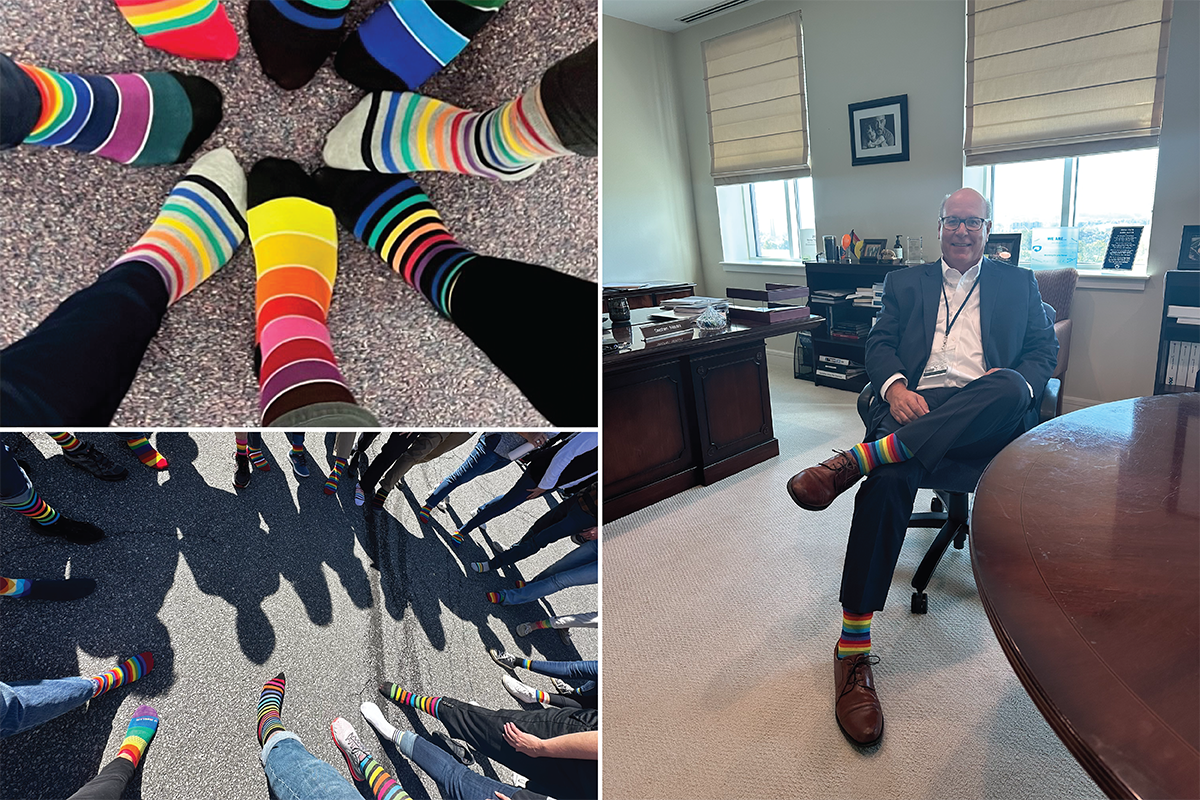Penn State Health socks out bias on National Coming Out Day

Penn State Health celebrated National Coming Out Day on Oct. 11 by encouraging everyone to “sock out” bias and discrimination against the lesbian, gay, bisexual, transgender and queer (LGBTQ+) communities. Participants wore rainbow socks to show their support. Each year, the observance also serves as an opportunity to help eliminate health-related inequalities, called disparities, and challenges that impact these communities.
Employees are encouraged to identify and take one action to help eliminate bias and promote health equity.
What everyone should know about bias and health equity
Social inequality and poor health are often connected, and sexual orientation is associated with an increased risk of multiple health-related problems. For example, those in the LGBTQ+ community are 2.5 times more likely to experience depression, anxiety and substance misuse compared to their heterosexual peers. In addition, LGBTQ+ youth are more likely to experience:
- Bullying
- Feeling sad or hopeless
- Being forced to have sex
- Serious thoughts of suicide
- Illicit drug use
- Misuse of prescription opioids
While differences in sexual orientation contribute to some of these disparities, other inequities at the social and organizational levels, including bias, discrimination and stigma, play a major role in making these health challenges worse.
Taking action to promote greater health equity
Penn State Health is actively addressing bias and promoting health equity for LGBTQ+ communities. In 2010, the health system created the first LGBTQ+ Business Employee Resource Group, which has expanded to cover all Penn State Health regions. This group participates in regional PRIDE events, focusing on mental health support and smoking cessation. More recently, the group led efforts to create a policy to guide individuals on how to transition, including the use of pronouns.
Since 2017, the Sexual Gender Minority Advisory Council has prioritized the needs of the LGBTQ+ community. With members from various teams and the LGBTQ+ community, the council works toward inclusive practices and an equitable environment for everyone receiving care at Penn State Health. The council has led initiatives that included adding preferred pronouns to patient records and developing programs to support LGBTQ+ patients and their families.
You can help eliminate bias and support health equity
Each employee is encouraged to support quality and safe health care for LGBTQ+ patients by taking one or more of the following actions:
- Understand needs: Make an effort to understand the LGBTQ+ community’s health care needs and disparities. Include LGBTQ+ members in the development of outreach programs and research studies.
- Use inclusive language: Consistently avoid gendered terms, include your pronouns when introducing yourself and in emails, and show respect for others’ pronouns by asking for theirs.
- Learn about unconscious biases: Participate in the Inclusion Academy program offered by the Office for Diversity, Equity, and Inclusion. Explore the impact of unconscious bias and attend Upstander Café sessions to learn how to stand up against bias. Visit the Diversity Office’s calendar for upcoming events.
- Promote LGBTQ+ employment: When filling positions, collaborate with your Human Resources partner to identify organizations supporting LGBTQ+ employment and increase representation in your workforce.
- Ensure diversity in communications: Reflect diversity beyond race and gender in communications. Include perspectives from the LGBTQ+ community, such as featuring same-sex couples, nonbinary individuals and nontraditional families.
- Demonstrate commitment: Pledge to eliminate bias and discrimination against the LGBTQ+ community. Attend Pride events and National Coming Out Day on Oct. 11, 2024. Share ideas with the Diversity Office and help plan activities to create a supportive environment for LGBTQ+ individuals.
- Support LGBTQ+ organizations: Participate in events that center on LGBTQ+ community members and the resources available to them, including:
If you're having trouble accessing this content, or would like it in another format, please email Penn State Health Marketing & Communications.
